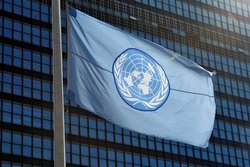 Members of the United Nations Security Council sat in silence listening to the harrowing account of Kachi Amo Saloh, as he explained how his entire family was killed before his eyes by Daesh terrorists in Iraq five years ago.
Members of the United Nations Security Council sat in silence listening to the harrowing account of Kachi Amo Saloh, as he explained how his entire family was killed before his eyes by Daesh terrorists in Iraq five years ago. RNA - Kachi addressed the UN chamber via teleconference on Tuesday sharing his story and expressing his community’s support for the mandate of the UN Investigative Team for accountability of Daesh known as UNITAD.
Established in 2017, UNITAD is supporting Iraqi domestic efforts to hold Daesh accountable for crimes it committed in the war-ravaged country by collecting, preserving, and storing evidence in Iraq of acts that may amount to war crimes, crimes against humanity and genocide.
The special adviser and head of UNITAD also briefed the council members after his recent visit to Iraq. This was his third briefing since the establishment of UNITAD through a UN Security Council resolution.
The Iraqi ambassador to the UN, for his part expressed support for the UNITAD team but also stressed the urgency to bring Daesh terrorists to justice as soon as possible.
According to Press TV, the international crimes that UNITAD is mandated to investigate are not incorporated into the domestic legal system of Iraq and are currently prosecuted as terrorist crimes.
However, Baghdad is working towards introducing legislation that would allow for Daesh crimes to be prosecuted as genocide, war crimes, and crimes against humanity, a request survivors including Kachi, have called for time and again.
The Security Council meeting concluded with an understanding that the success of the UN investigative team will depend first on its impartial findings; and second, as a collective effort by the world body, the Iraqi government and the victims and survivors of Daesh but also NGOs and academic institutions.
847/940